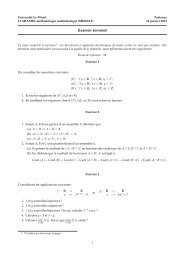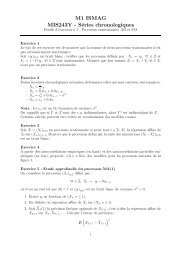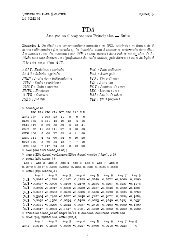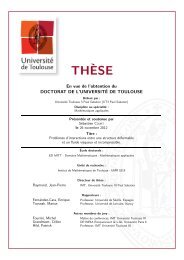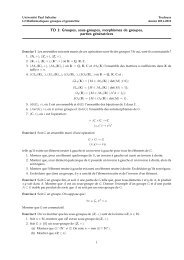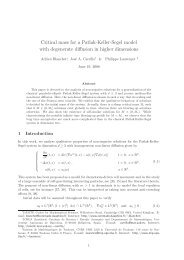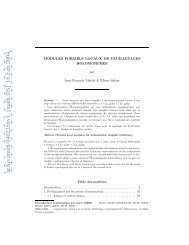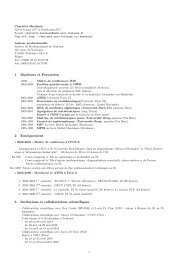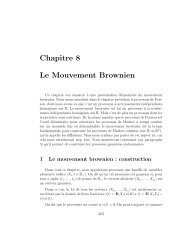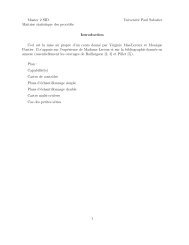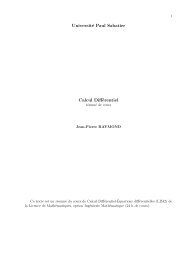Optimal Control of Partial Differential Equations
Optimal Control of Partial Differential Equations
Optimal Control of Partial Differential Equations
You also want an ePaper? Increase the reach of your titles
YUMPU automatically turns print PDFs into web optimized ePapers that Google loves.
60 CHAPTER 5. CONTROL OF THE HEAT EQUATION<br />
The function f belongs to L 2 (Q), χω is the characteristic function <strong>of</strong> ω, ω is an open subset<br />
<strong>of</strong> Ω, and the function u is a control variable. We suppose that V ∈ (L ∞ (Q)) N . We want to<br />
study the control problem<br />
(P5) inf{J5(z, u) | (z, u) ∈ C([0, T ]; L 2 (Ω)) × L 2 (0, T ; L 2 (ω)), (z, u) satisfies (5.5.28)},<br />
where<br />
J5(z, u) = 1<br />
<br />
(z − zd)<br />
2 Q<br />
2 + 1<br />
<br />
(z(T ) − zd(T ))<br />
2 Ω<br />
2 + β<br />
<br />
χωu<br />
2 Q<br />
2 ,<br />
and β > 0. We assume that zd ∈ C([0, T ]; L 2 (Ω)).<br />
We first study equation (5.5.28) by a fixed point method. For that we need a regularity for<br />
the heat equation that we state below.<br />
Regularity result. For any 1 < q < ∞, there exists a constant C(q) such that the solution<br />
z to the heat equation<br />
satisfies<br />
∂z<br />
∂t<br />
− ∆z = f in Q, z = 0 on Σ, z(x, 0) = 0 in Ω,<br />
z C([0,T ];L 2 (Ω)) + z L 2 (0,T ;H 1 0 (Ω)) ≤ C(q)f L q (0,T ;L 2 (Ω))<br />
1 - Now we choose 1 < q < 2. Let r be defined by 1<br />
2<br />
+ 1<br />
r<br />
for all f ∈ L q (0, T ; L 2 (Ω)).<br />
= 1<br />
q , and ¯t ∈]0, T ] such that<br />
C(q)¯t 1/r V (L ∞ (Q)) N ≤ 1<br />
2 . Let φ ∈ C([0, ¯t]; L 2 (Ω)) ∩ L 2 (0, ¯t; H 1 0(Ω)), and denote by zφ the<br />
solution to equation<br />
∂z<br />
∂t − ∆z = f + χωu − V · ∇φ in Q, z = 0 on Σ, z(x, 0) = z0 in Ω. (5.5.29)<br />
Prove that the mapping<br />
φ ↦−→ zφ<br />
is a contraction in C([0, ¯t]; L 2 (Ω)) ∩ L 2 (0, ¯t; H 1 0(Ω)).<br />
2 - Let ˆz be the solution in C([0, ¯t]; L 2 (Ω)) ∩ L 2 (0, ¯t; H 1 0(Ω)) to equation<br />
∂z<br />
∂t − ∆z + V · ∇z = f + χωu in Ω × (0, ¯t), z = 0 on Γ × (0, ¯t), z(x, 0) = z0 in Ω.<br />
The existence <strong>of</strong> ˆz follows from the previous question. Let φ ∈ C([0, 2¯t]; L 2 (Ω))∩L 2 (0, 2¯t; H 1 0(Ω))<br />
such that φ = ˆz on [0, ¯t], and denote by zφ the solution to equation<br />
∂z<br />
∂t − ∆z = f + χωu − V · ∇φ in Q, z = 0 on Σ, z(x, 0) = z0 in Ω. (5.5.30)<br />
Prove that the mapping<br />
is a contraction in the metric space<br />
φ ↦−→ zφ<br />
{φ ∈ C([0, 2¯t]; L 2 (Ω)) ∩ L 2 (0, 2¯t; H 1 0(Ω)) | φ = ˆz on [0, ¯t]},



